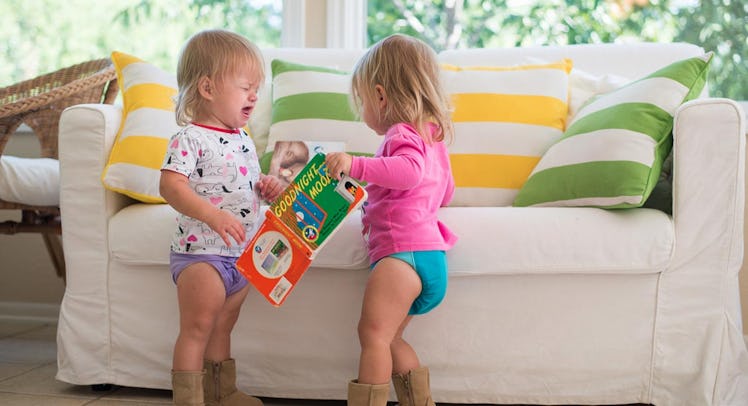The Case Against Forcing Your Kid To Share Their Stuff
"You want these Hot Wheels? Take a hike."

Long ago in a time known as the 80s, a group of pastel bears with belly tattoos lived in a psychedelic world of clouds, rainbows and saccharine happiness. These disgustingly cute ursine companions lived by a code deeply ingrained in their overly-simplistic societal norms: “Sharing is caring.” Soon the call was picked up by adults who began forcing young children to share in the name of caring. But no one asked if it was right.
It turns out that these bears of caring may have been leading you astray for decades. And now an important question is finally being asked: should your kid be forced to share? The answer may be a resounding “no.”
Sharing Is Not Natural
According to current research, if your kid is under 5 they’re unlikely to even have the ability to grasp the social complexities around sharing. much less see why it’s important. It literally does not make sense — like a David Lynch movie.
That’s because sharing requires a couple of important things that your toddler or preschooler does not understand. These are wrapped up in the idea of prosocial behavior (which is not another word for acting as a paid brand ambassador on Snapchat).
First of all, sharing requires an understanding of what another person wants. This is based on an understanding of self and the other. Sharing also requires the ability to grasp the concept that something shared will be given back. None of the concepts are really expertly grasped until 7 years old for most kids.
The Case Against Forced Sharing
Based on this research there’s been a slowly emerging “no sharing” movement developing in the U.S. The idea is that when your kid has a toy or object they love and another kid wants to play with it, that it’s totally cool for your kid to take ownership and tell them to take a hike.
That’s largely counter to the parental norm. Most parents want to enforce a sense of generosity and morality by telling their kid to give up the possession. But no-sharing advocates suggest that it’s counterintuitive, and not just because it’s counterintuitive in adulthood (you’d break someone’s arm if they forced you to share your remote control BB-8).
No-sharers suggests giving your kid the ability to chose when to share (by giving a turn) works better to building generosity. Recent Cornell University research seems to back this up. It also allows the wanters to learn lessons of patience and generally not turn into entitled jerk-faces who get what they want when they want it.
The Case For Child-Directed Turn-Taking
This is not to say that you should tell your kids to be selfish. Instead, the no-sharing types suggest that you should encourage your kid to recognize how it must feel for the person who wants to play. This (hopefully) leads to problem solving behavior that will allow a resolution through turn taking.
You can do this several ways. One is just by backing off and letting the struggle ensue until something is worked out. Another is to help kids talk through it by helping them express their emotions about the situation.
The flip side of letting your kid say no to sharing, of course, is to help them cope with the disappointment of waiting. And these disappointments are tough. But again, it gives you a chance to help your kid talk out their feelings. After all, if the Walking Dead is any indication, they have a lifetime of disappointment ahead of them. Better get used to it. This ain’t Care-A-Lot.
This article was originally published on